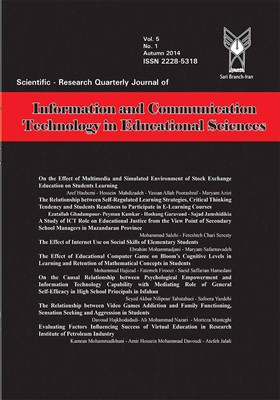Evaluating Factors Influencing Success of Virtual Education in Research Institute of Petroleum Industry
Subject Areas : Infomartion Technology
Kamran Mohammadkhani
1
,
Amir Hossein Mohammad Davoudi
2
![]() ,
Atefeh Jalali
3
,
Atefeh Jalali
3
1 - Assistant Professor of Higher Education Administration, Science and Research Branch, Islamic Azad University, Tehran, Iran
2 - Assistant Professor of Educational Administration, Saveh Branch, Islamic Azad University, Saveh, Iran
3 - M.A. in Educational Administration, Science and Research Branch, Islamic Azad University, Tehran, Iran
Keywords: virtual education, system quality, information and content quality, teacher’s quality, operator’s intention,
Abstract :
Using virtual education helps in creating, managing and developing education effectively, rapidly and economically. The success of virtual education today stands among the most significant subjects in the educational administration. The purpose of the present study was to evaluate the factors influencing the success of virtual education including system quality, information and content quality, facilitative factor, teachers' quality, teachers-students interaction and operators' intention. The research method was descriptive and survey. Data gathering instrument was a self-administered questionnaire approved by the experts. The reliability was calculated using Cronbach coefficient with the ratio of 0.92. The statistical population of the study consisted of all experts in the Research Institute of Petroleum industry (RIPI) who had passed the related virtual education in 2012 (N=250). Using stratified random sampling, 156 people were chosen as sample. To analyze the data, descriptive statistics including mean and standard deviation was used. Inferential statistics including Kolmogorov-Smirnov test, one-sample t test and Freidman test were used to verify the hypotheses. Results showed that the factors influencing the success of virtual education in the (RIPI) were evaluated in an appropriate condition. Prioritizing the factors, it was also revealed that information and content qualify, operators' intention and system qualify stood in better conditions comparing the other factors.
e-Learning, pages 19-26, University of Cape Town.


